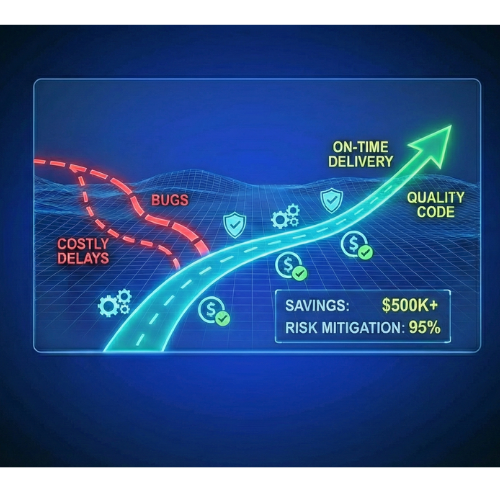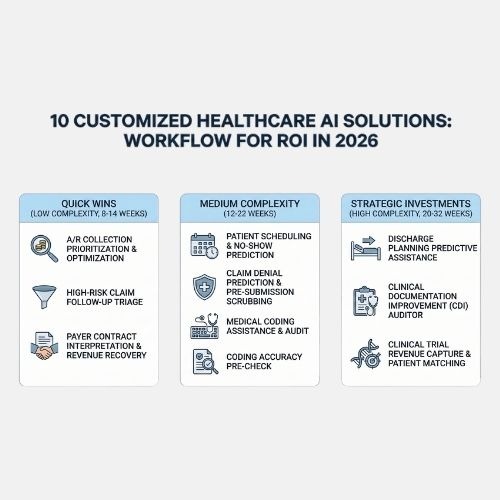Machine learning is transforming the healthcare industry by improving patient care, streamlining processes, and offering innovative solutions to complex medical challenges.
From enhancing medical image analysis to helping pharmaceutical companies speed up the drug discovery process, machine learning models are creating new opportunities across healthcare. In this blog, we’ll explore seven key benefits of machine learning applications in healthcare and how they impact both healthcare professionals and patients alike.
1. Improved Medical Imaging and Diagnostics
One of the most valuable applications of machine learning in healthcare is its ability to analyze medical images with incredible accuracy. Machine learning algorithms are used to detect abnormalities in X-rays, MRIs, and other scans, often faster and more accurately than traditional methods. These models help healthcare professionals diagnose conditions like cancer, heart disease, and neurological disorders earlier, leading to quicker treatments and better patient outcomes.
Key benefits:
- Enhanced accuracy in detecting abnormalities
- Faster diagnosis of serious conditions
- Early intervention leading to better outcomes
2. Personalized Treatment Plans
Machine learning models allow for more personalized treatment plans by analyzing patient data in real time. Through the application of machine learning in healthcare, healthcare professionals can tailor treatments based on individual patient records, genetic data, and lifestyle factors. This approach results in more effective treatment plans, especially for chronic diseases such as diabetes, heart disease, and cancer.
Key benefits:
- Tailored treatment plans based on real-world patient data
- Improved effectiveness of chronic disease management
- Data-driven decisions for individualized care
3. Streamlined Clinical Trials
Clinical trials are a critical part of developing new treatments, but they can be time-consuming and expensive. AI and machine learning in healthcare are changing that by optimizing the clinical trial process. Machine learning algorithms help identify the best candidates for trials based on electronic health records and patient data, speeding up recruitment and improving the accuracy of trial results. This results in shorter trial times and quicker access to new treatments.
Key benefits:
- Faster recruitment for clinical trials
- More accurate trial results
- Accelerated drug discovery process
4. Enhanced Drug Discovery Process
Pharmaceutical companies are using machine learning models to speed up the drug discovery process. By analyzing vast amounts of medical records, scientific literature, and patient data, machine learning can predict which compounds are most likely to succeed in treating specific diseases. This reduces the time and cost associated with traditional drug development while bringing life-saving treatments to market faster.
Key benefits:
- Reduced time and cost in drug discovery
- Predictive analysis of drug success
- Faster access to new medications for patients

5. Efficient Data Collection and Analysis
Machine learning algorithms excel at handling large datasets, making them ideal for analyzing complex healthcare data. From patient records to real-time data collection from medical devices, machine learning can quickly process and identify trends. This ability to analyze electronic health records and other patient information helps healthcare professionals make more informed decisions about treatment options and patient care.
Key benefits:
- Efficient handling of large datasets
- Real-time analysis of patient data
- Informed decision-making for healthcare professionals
6. Predictive Analytics for Better Outcomes
Another key example of machine learning in healthcare is its use in predictive analytics. Machine learning models can analyze patient records and medical data to predict potential health risks, such as the likelihood of heart disease, diabetes, or other chronic conditions. By using real-world data, these models help healthcare providers intervene earlier and take preventative measures to improve patient health outcomes.
Key benefits:
- Early detection of health risks
- Preventative care based on predictive analytics
- Improved patient outcomes through early intervention
7. Improved Natural Language Processing (NLP) for Patient Care
Natural language processing (NLP) is a subset of machine learning that can interpret and analyze unstructured data, such as doctors’ notes, medical records, and research papers. In healthcare, NLP applications help healthcare professionals better understand patient data and make more informed decisions. By extracting insights from these documents, machine learning in healthcare ensures that no vital information is missed, leading to more accurate diagnoses and improved care.
Key benefits:
- Interpretation of unstructured data (e.g., medical records, doctor’s notes)
- Better insights into patient data for improved care
- More accurate diagnosis and treatment plans
The Bottom Line
Machine learning applications in healthcare are revolutionizing the way healthcare professionals diagnose, treat, and manage patient care. From improved medical image analysis to personalized treatment plans and more efficient data collection, the benefits of machine learning in healthcare are vast.
By leveraging AI and machine learning algorithms, the healthcare industry can make faster, more accurate decisions, ultimately improving patient outcomes and enhancing the quality of care. Whether it’s streamlining the clinical trial process or helping doctors predict potential health risks, machine learning is paving the way for a smarter, more efficient healthcare system.



